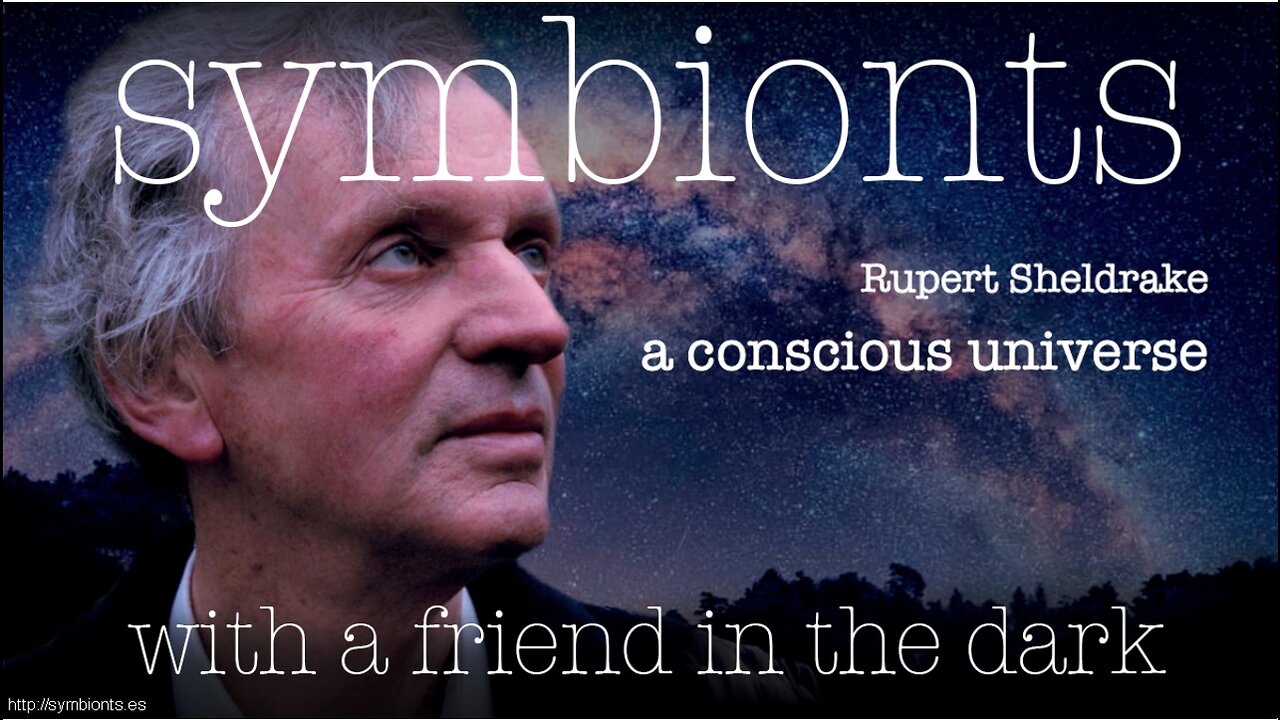Premium Only Content

Rupert Sheldrake - a concious universe
Las ciencias apuntan hacia un nuevo sentido de un mundo vivo. El cosmos es como un organismo en desarrollo, y también lo es nuestro planeta, Gaia. Las leyes de la Naturaleza pueden ser más como hábitos. En parte como resultado del 'difícil problema' de encontrar espacio para la conciencia humana en la cosmovisión materialista, hay un interés renovado en las filosofías panpsiquistas, según las cuales alguna forma de mente, experiencia o conciencia está asociada con todos los sistemas de autoorganización. incluyendo átomos, moléculas y plantas. Tal vez el sol es consciente, al igual que otras estrellas y galaxias enteras. Si es así, ¿qué pasa con la mente del universo como un todo? Rupert Sheldrake explorará algunas de las implicaciones de esta idea. Rupert Sheldrake es biólogo y autor de más de 85 artículos científicos, y fue nombrado entre los 100 principales líderes de pensamiento global de 2013. Estudió ciencias naturales en la Universidad de Cambridge, donde fue becario del Clare College, obtuvo una doble licenciatura de primera clase y recibió el Premio de Botánica de la Universidad en 1963. Luego, el Dr. Sheldrake estudió filosofía e historia de la ciencia en Harvard antes de regresar a Cambridge. , donde obtuvo un doctorado. en bioquímica en 1967. Es autor de 13 libros, y en 2012 publicó 'The Science Delusion'. Este libro examina los diez dogmas de la ciencia moderna y muestra cómo pueden convertirse en preguntas que abren nuevas perspectivas de posibilidades científicas. Recibió el premio Libro del Año de la Red Médica y Científica Británica. Su libro más reciente: 'Formas de ir más allá y por qué funcionan' se publicó en 2019, y analiza siete prácticas espirituales que son personalmente transformadoras y tienen efectos medibles científicamente. Puede mantenerse al día con el trabajo de Rupert en su sitio web: www.sheldrake.org
The sciences are pointing toward a new sense of a living world. The cosmos is like a developing organism, and so is our planet, Gaia. The laws of Nature may be more like habits. Partly as a result of the ‘hard problem’ of finding space for human consciousness in the materialist worldview, there is a renewed interest in panpsychist philosophies, according to which some form of mind, experience or consciousness is associated with all self-organizing systems, including atoms, molecules and plants. Maybe the sun is conscious, and so are other stars, and entire galaxies. If so, what about the mind of the universe as a whole? Rupert Sheldrake will explore some of the implications of this idea.
Rupert Sheldrake is a biologist and author of more than 85 scientific papers, and was named among the top 100 Global Thought Leaders for 2013. He studied natural sciences at Cambridge University, where he was a Scholar of Clare College, took a double first class honours degree and was awarded the University Botany Prize in 1963. Dr Sheldrake then studied philosophy and the history of science at Harvard before returning to Cambridge, where he took a Ph.D. in biochemistry in 1967.
He is the author of 13 books, and in 2012 he published ‘The Science Delusion’. This book examines the ten dogmas of modern science, and shows how they can be turned into questions that open up new vistas of scientific possibility. It received the Book of the Year Award from the British Scientific and Medical Network. His most recent book: ‘Ways To Go Beyond, And Why They Work’ was published in 2019, and looks at seven spiritual practices that are personally transformative and have scientifically measurable effects. You can keep up to date with Rupert’s work on his website: www.sheldrake.org.
https://symbionts.es/rupert-sheldrake-a-concious-universe/
-
 1:00:36
1:00:36
Talk Nerdy 2 Us
5 hours agoDigital Surveillance, TikTok Shutdowns & The Hackers They Don’t Want You to Know About!
28.8K1 -
 3:08:37
3:08:37
SpartakusLIVE
8 hours agoDelta Force || Tactical, Strategic, HARDCORE
42.5K2 -
 3:32:05
3:32:05
I_Came_With_Fire_Podcast
12 hours agoTRUMP GUILTY Verdict, LA Fires, New American EXPANSIONISM, and Cyber Truck Updates!!
18K8 -
 1:26:05
1:26:05
Glenn Greenwald
8 hours agoGOP Senators Demand Tulsi Support Domestic Surveillance To Be Confirmed; Group Tracks IDF War Criminals Around The World; System Pupdate: Pointer's Determination To Survive | SYSTEM UPDATE #387
91.7K59 -
 57:27
57:27
Flyover Conservatives
1 day agoHealthy People Are Ungovernable: The Secrets They Don’t Want YOU to Know - Tracy Beanz | FOC Show
44.1K4 -
 8:36:11
8:36:11
Dr Disrespect
15 hours ago🔴LIVE - DR DISRESPECT - DELTA FORCE - INTENSE SITUATIONS ONLY!
241K27 -
 4:01:30
4:01:30
Nerdrotic
11 hours ago $33.42 earnedHollywood National DISASTER! Studios Terrified, Star Wars FAIL | Friday Night Tights 336 w Raz0rfist
139K43 -
 2:52:10
2:52:10
Edge of Wonder
11 hours agoLA Fires: Biblical Inferno as Hollywood Burned Down
43.4K12 -
 12:35
12:35
China Uncensored
9 hours agoHas the Coverup Already Begun?
56.8K31 -
 1:09:12
1:09:12
The Big Mig™
13 hours agoLet’s Talk Music “Karmageddon” w/ Iyah May
43.8K8